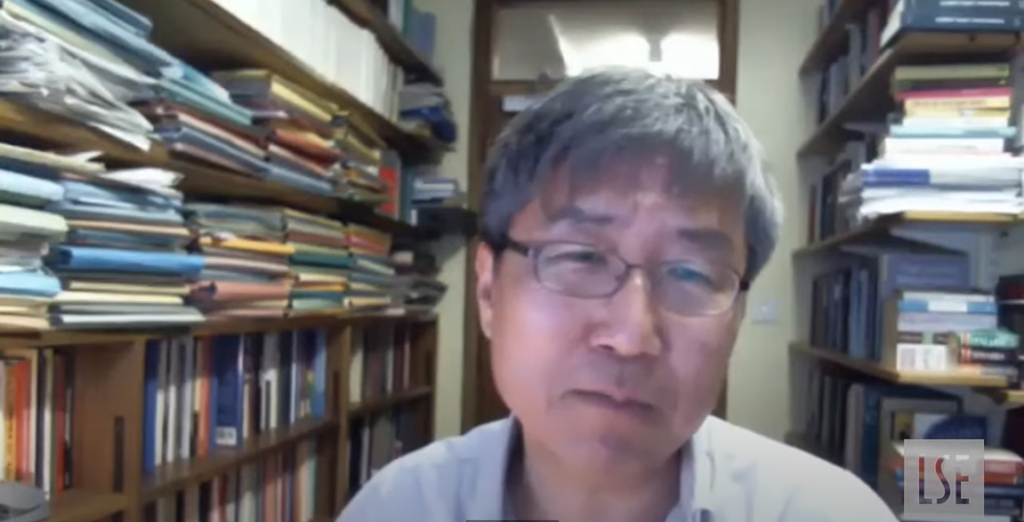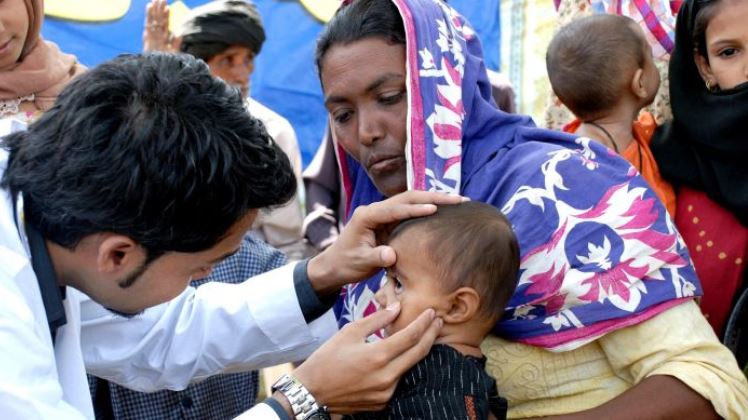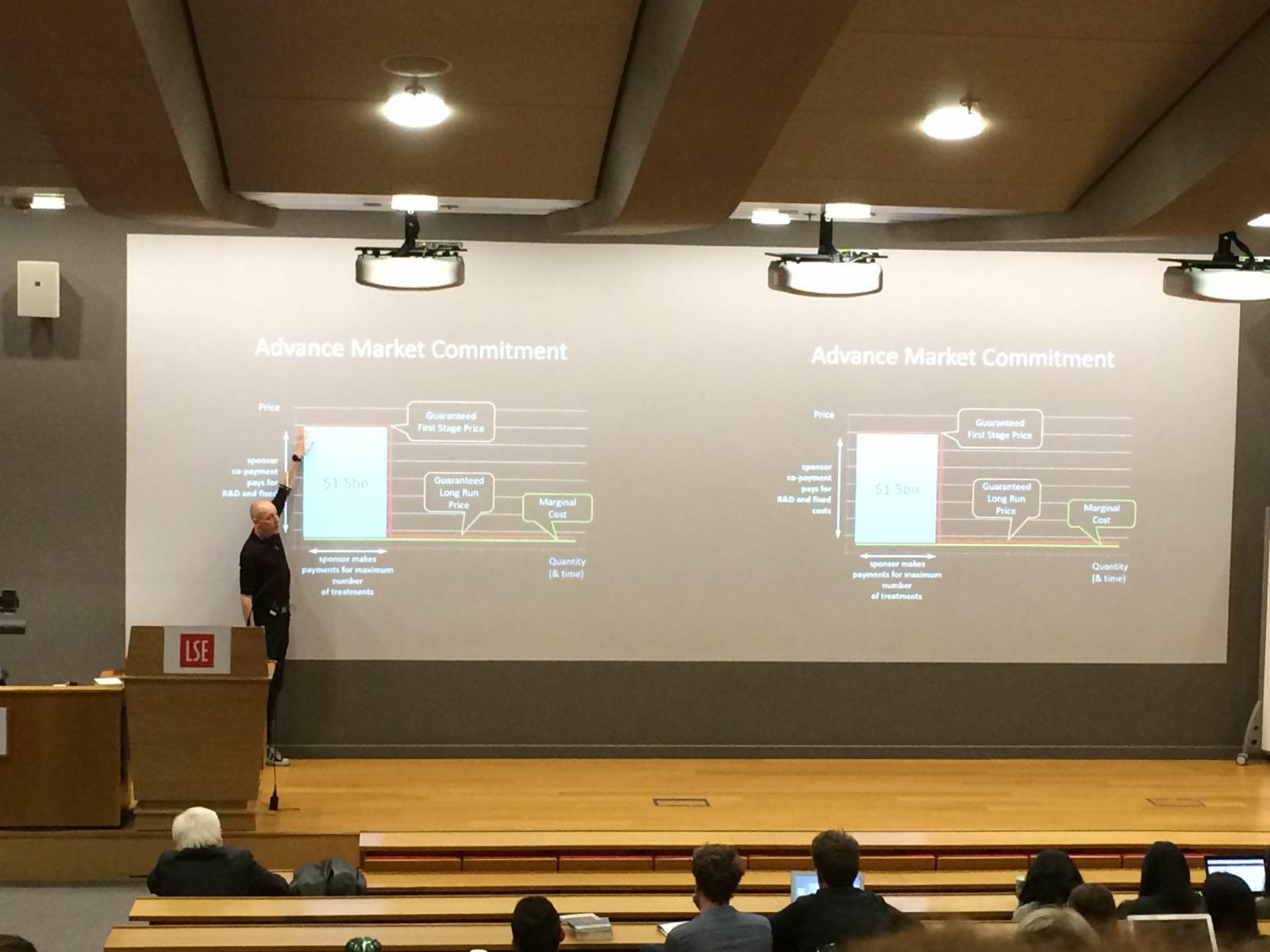On Friday 8 October, Ha-Joon Chang gave an online lecture on ‘The Political Economy of Parasite (the movie)’ as part of the Cutting Edge Issues in Development Lecture Series for 2021/22. Ha-Joon Chang used the first ever non-English-language winner of the Academy Award for Best Picture, Parasite, by Bong Joon-ho, in order to analyse the political economy of inequality in today’s South Korea. Ha-Joon Chang is a Professor of Political Economy of Development at Cambridge. Read what MSc students Sara Casadevall-Belles, Sohee Kim, Sze Vei Leong and Henry Lowe took away from the lecture below.
You can watch the lecture back on YouTube or listen to the podcast.

Parasite and Squid Game have more in common than you think: not only do they try to depict the gravity of socio-economic inequalities in Korea, but their main characters’ precarious situation originates from the same failed entrepreneur venture: a failed fried chicken restaurant. This is not a coincidence, but a shared story between many Koreans after the liberalisation of the country’s economy in the 1990s as the economist Ha-Joon Chang explained in his talk ‘The political economy of Parasite (the movie)’.
Chang argued that behind the socio-economic inequalities depicted in Parasite lies the history of South Korea, hereafter Korea, over the past 60 years. The country went from being one of the poorest countries in the world (USD 93 per capita in 1962) to one of the richest (USD 31000 per capita in 2009) in less than a person’s lifetime. However, whilst inequality was kept low during these miracle years, most recently, Korea became one of the most unequal countries within the OECD.
During the 1960s-1980s, Korea experienced fast economic growth while keeping a relatively equal society with high social mobility. Chang explained growth was due to a radical transformation of the country’s production structure and capabilities. Inequalities were kept low due to the following three main factors: the government restrained the ability of the market to generate inequality with a highly regulated market; (for instance, extensive policies to protect small businesses); the extended family network, as we can see in Parasite, offers crucial support for individuals; and rapid economic growth created a lot of jobs, protecting people from the shocks of unemployment.
Korea’s economic growth, however, slowed down in the 1990s with the wave of liberalisation and deregulation of the markets. This liberalisation was accelerated with the 1997 financial crisis when the US and other rich countries used the IMF risk program as a lever to open the Korean markets. Consequently, Korea experienced a slow-down in growth, resulting in higher unemployment. At the same time, the welfare state remained small: a mere 2.7% of GDP in 1990 and 3.1% in 1995.
To Chang, this process had two main repercussions in Korean society showcased in Parasite:
Firstly, the losers of deregulation were the unemployed workers in their 50s. The only option left was to set up their own businesses. People, like the Kim family’s father in Parasite, Ki-taek, or Squid Game’s main character Seong Gi-hun tried to set up fried chicken restaurants because restraints on market forces were still quite strong in small restaurants. However, deregulation of these sectors eventually took place and those in similar situations lost their jobs, went bankrupt, and became highly indebted.
Secondly, there was a sharp drop in social mobility. In Parasite, one of the first interactions between the two main families is the opportunity for the oldest son from the basement-dwelling family to work as a private tutor for the wealthy Park’s family. This reflects the importance of private tutors for rich families due to the increasing barriers to access university. What makes candidates stand out are extracurricular activities or expensive private tutoring for university entrance exams, which poor families, like the Kim family, can’t afford. Rather, they become part of the system that benefits the rich.
Given these clear structural mechanisms perpetuating inequalities in Korea, Ha-Joon Chang believes there is an urgent need to change the education system and especially in the university application process, as well as an expansion of the welfare state to allow children from less-privileged families to have a chance in scaling up the social ladder[1].
While Parasite does a great job depicting social inequalities in Korea, to which Chang helped us understand its origin, most of Parasite’s scenes are also common in many other countries. In the words of Parasite director, Bong Joon-ho: “The film talks about two opposing families, about the rich versus the poor, and that is a universal theme because we all live in the same country now: that of capitalism”. If you haven’t watched Parasite yet, wait no more!
[1] Ha-Joon Chang, South Koreans Worked a Democratic Miracle. Can They Do It Again?, The New York Times (2017) https://www.nytimes.com/2017/09/14/opinion/south-korea-social-mobility.html
Sara Casadevall-Belles
_______________
South Korean economic growth is often shown through the miracle years of 1960-1997, starting with Park Chung Hee’s economic reforms. Interestingly, South Korea was an example of growth with equity, with inequality falling for a decade between the mid-80s to the mid-90s. However, the 1997 Financial Crisis marked a transition from state-led capitalist development to increasingly neoliberal reforms, driven by chaebols (family-owned conglomerates) wanting to break away from the very state restraints they grew from. As a consequence, high economic inequality is a recent phenomenon, with only the US consistently being more equal than South Korea in countries with over $30,000 per capita.
Bong Joon Ho’s Parasite presents South Korea’s deepening economic inequality through scenes such as continually descending flights and flights of stairs, as well as “crossing the line” to visually present the class divide. ‘Hell Joseon’ is a term popular among the youth to describe the feelings of hopelessness associated with the worsening wealth gap and the consequences for university admissions and employment. There is intense competition for jobs, reflected in the increasing pressure to succeed in higher academia. As a result, we see that the advantages from cram schools and tutoring have become much more important, as well as extracurricular activities have placed wealthier families at a huge advantage. This is also prominent in Sky Castle, illustrating a successful tutor who charges extremely high amounts to tutor the children of the elite.
“If you believe that you are in a just world, then, failure is particularly damaging to self-respect”. – Francisco Ferreira
This was a particularly strong and evocative quote, which suggests a sense of self-blame when failing to succeed. South Korea has a very high suicide rate amongst the elderly, with low social spending (7.6% of GDP vs the OECD average of 19%). The redundancy of older workers is left unable to rely on the welfare state to find better jobs, while simultaneously, rapid industrialisation and urbanisation have separated families. The previous Confucian social structure of children looking after their parents have disappeared with the turn of the century, Hence, laid-off workers use their severance payments to set up their own businesses (25% self-employment rate, 5th in the world). However, many are driven into bankruptcy, reflected in the experiences of Kim Ki-Taek in Parasite and Seong Ki-hun in Squid Game.
These media critiques paint a stark contrast to the typical portrayal of the successful economic and structural transformation in South Korea. Parasite and Squid Game criticises the socioeconomic inequalities in the country, telling a tale of the various barriers to upwards mobility today.
Sze Vei Leong
_______________
Two men run small businesses, one selling fried chicken, and the other, Taiwanese castella. They both suffered from terrible poverty due to business failures. The two men confront each other near the last point of the movie. While there is some bloodshed, the two have one big thing in common: hiding and living in the basement of a magnificent mansion in Seoul. Last year’s Oscar-winning film ‘Parasite’ is an action narrative that captures their miserable lives in an economically polarized society.
Ha-Joon Chang, a professor at Cambridge University, explained at a lecture, ‘Parasite’ is a film that holds a mirror up to Korean society. In Korea, as the labour market becomes more flexible and unemployment increases, more and more people have started small-scale self-employed businesses, similar to how the characters in Parasite sell chicken or castella. According to the OECD, the percentage of Koreans who were self-employed reached 25% in 2019 (15% in Europe, 10% in Japan, 6% in the United States). Businesses easily go bankrupt due to oversaturation, and there is a lack of social safety nets for business owners to rely on.
Originally, the Korean government had implemented strong market regulations that sought to protect small farms, shops, firms, and labourers from the 1960s. Although there were almost no welfare policies, workers are not fired easily and small businesses hardly went to bankruptcy. Thanks to these regulations, Korea maintained a low inequality index with high economic growth from the 1960s to the mid-1990s. Chang said, “The World Bank used to introduce Korea as the best example of a country that has achieved growth with equity”.
However, Chang argues that since the mid-1990s, Korea entered a ‘low growth with inequality’ phase due to the neoliberal economic reform. With the resignation of the military dictatorship and the inauguration of the civilian government in 1993, government regulations lost power and began to be eased. The market liberalisation was accelerated by IMF financial relief during the 1997 foreign exchange crisis in Korea. The labour market has become too flexible and small businesses are no longer protected by regulations. People who once lost a job could not easily recover their economic status and it caused economic inequality.
Inequality has caused Korea’s economy to become stagnant. He said “[economic] inequality reduced growth by increasing political instability and repressing demand. Neoliberalism itself is also not good for economic growth because it creates an excessively liquid financial market and discourages long-term oriented investment.”
As a result, according to the OECD, Korea’s income inequality using the Atkinson index was 0.32 in 2016, the fourth-highest among 33 countries. Korea was the number one country in suicide rates as of joining the OECD in 2015, and the elderly suicide rate is four times higher than the OECD average. The number of births in Korea in 2018 was the lowest in the world at 0.98 per year because the younger generation has avoided childbearing, claiming economic and social difficulties. The young generation often uses the term ‘Hell Chosun’ (An old name of Korea) to satirize Korea.
However, Chang admitted it is impossible to tighten regulations again to be as they were in the 1980s. This is because consumer utility has increased as the market has been liberalised due to government deregulation. For example, there are already large supermarkets that sell high-quality products at low prices, so protecting small markets would be inefficient.
Chang argued that welfare policies should be strengthened to help those who have struggled to survive in a liberalized market. “The government should come up with measures to support self-employed people at risk and complement the educational system to strengthen social mobility” he added.
Sohee Kim
_______________
Ha-Joon Chang has a good track record of making economics approachable and easily understandable. Dr Chang’s reading of Parasite is another good example of how alternative approaches to economics deliver complex economic ideas in an accessible, engaging, and informative way. This reading showcases how Parasite’s narrative is a tale of Korea’s unique economic inequity.
The film presents two working-class families battling to survive in a fiercely competitive and inequitable economy. Both families have a fair amount in common: they have struggled to find and retain work; they have limited support outside their immediate family, and depend upon their parasitic relationship with a wealthy family to survive. Dr Chang explained how this is a uniquely Korean tale of inequality.
Chicken Shops & Liberalisation
One of the key details that is common across both families having failed to retain work in chicken shops. Chang describes how in Korea this has become a symbol of Korea’s socially disastrous economic liberalisation. Korea has the highest density of chicken shops in the world despite Koreans eating a relatively small amount of chicken. This is because it is one of few sectors that is still protected against competition from large outlets. The relatively accessible nature of this sector drives many Koreans to start careers in this sector in the hope that it will provide income safe from inequitable competition. However, the sheer number of Koreans squeezed into this sector by inequitable competition in other sectors has grossly oversaturated the market.
The (Nuclear) Family
Chang stated that historically large family networks acted as an economic safety blanket in place of Korea’s welfare state. Parasite prevents nuclear family units from fighting to survive, which taps into how during economic liberalisation this large family network of support was lost. Parasite demonstrates how this can leave many Koreans with nowhere to turn to but loan sharks, insecure/poor employment, or nefariously acquired jobs.
Tutoring & Education
The Kim family initially entered the Park family through deceptively attaining jobs as tutors. This refers to how Korea’s education sector perpetuates inequality through exams that disproportionately advantage families that can afford tutors for their children.
Dr Chang’s reading of Parasite both accessibly explains the unique nature of Korean inequality but also showcases the nuances of Parasite’s symbolism, placing the film amongst the likes of Bicycle Thieves (1948), Strike (1925), and Billy Liar (1963) as one of the greatest ‘tales of inequality’.
Henry Lowe
_______________
The next guest lecture will be with Gabriel Palma on Friday 15 October 2021 on ‘Why the Rich Stay Rich (no matter what)’. LSE Students, Staff and Alumni can register here. External audiences can join the lecture via YouTube.
The views expressed in this post are those of the author and in no way reflect those of the International Development LSE blog or the London School of Economics and Political Science.






2 Comments